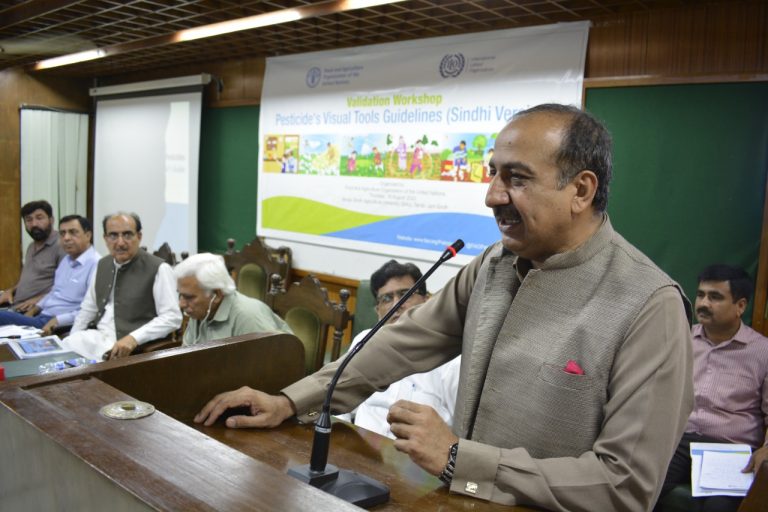
Some 160 million children have been identified doing child labor in the world, of which 70 percent children are involved in the agricultural sector and are exposed to harmful effects of pesticides.
Tando Jam
Agriculture experts have expressed concern over child labor in the agriculture sector and the adverse effects on pregnant women and infants due to the indiscriminate use of pesticides.
They expressed such concern at the inaugural ceremony of the Validation Workshop on pesticide’s visual tools guidelines organized by the Food Agriculture Organization (FAO) at Sindh Agriculture University (SAU) Tando Jam on Thursday.
Vice Chancellor SAU Dr. Fateh Marri speaking on this occasion said that the adverse effects of pesticides have seriously affected the health of women and children, especially the pregnant women working as the agricultural labor force.
He said that agriculture-related chemicals are being marketed by non-agriculture and less educated business people, who are creating dangers for agriculture, the environment, nature, and living beings with poor suggestions of pesticides. “Registration or membership of the Pakistan Engineering Council is mandatory for the construction sector, and B-Pharmacy degree for human medical representatives, thus agriculture graduate degree should also be made mandatory for the agriculture and pesticides business,” he urged.
 Shakeel Khan, National Coordinator, FMM, Food and Agriculture Organization (FAO) said that a visual guide is being prepared in Sindhi language for the farmers of Sindh on the use of pesticides, child labor, effects of pesticides on women and children, and preventive measures.
Shakeel Khan, National Coordinator, FMM, Food and Agriculture Organization (FAO) said that a visual guide is being prepared in Sindhi language for the farmers of Sindh on the use of pesticides, child labor, effects of pesticides on women and children, and preventive measures.
He said there are 160 million children working in child labor in the world, of which 70 percent of the children are involved in the agricultural sector, so there is a large number of children exposed to pesticides. He said in 1990, FAO exposed the impact of agricultural pesticides on children and child labor issues in the agricultural sector.
Dr. Jan Muhammad Marri, Pro-Vice Chancellor, SAU Sub-Campus, Umerkot, said that excessive use of pesticides also has a big impact on climate change, and all institutions should take strict and urgent measures in this regard,
Dr. Inayatullah Rajpar, Dean, Faculty of Crop Production said pesticides also leave negative effects on soil and water, and their damage also affects pregnant women and infants, especially children who work in the fields and markets are more affected.
Dr. Manzoor Ali Abro, Dean, Faculty of Crop Protection, said that about 400 companies in Sindh are doing business with about 200 different toxins without fear and without institutional approval, which is causing financial damage to crops, nature, and farmers’ health.
Dr. Aijaz Ali Khooharo, Dean, Faculty of Social Sciences, said that integrated pest management (IPM) has been neglected in agriculture, the import bill of pesticides has reached 20 billion in Pakistan, while the neighboring country is saving crops, nature, and capital by producing organic solutions. “Farmer School needs to be restored”, he suggested.
Dr. Muhammad Ismail Kumbhar, Director, University Advancement and Financial Assistance said that the food chain system has been affected due to pesticides, and the health problems in Sindh have increased to an alarming level, therefore agricultural, environmental, academia, and research institutions should form a coordinate committee consisting of stakeholders and the rules should be strictly implemented, while the Sindh Textbook Board should introduce the curriculum on food security and child labor and child work mandatory at primary and secondary levels.
Ghulam Mustafa Nagraj, Director, Agriculture Information said that the Department of Agricultural Extension Sindh is playing the role of a bridge between all agricultural public and private institutions.
Dr. Ashfaq Ahmed Nahiyoon, Provincial Coordinator Green Climate Fund (GCF) FAO, and others also spoke.
A large number of delegates from WWF, International Labor Organization (ILO), Nuclear Institute of Agriculture (NIA), Agricultural Research Sindh (ARS), Private Sector, Collective for Social Science Research, and other institutions, teachers, and students participated, and a group discussion session was also held on this occasion.
Registrar Ghulam Mohiyuddin Qureshi, Hussain Bux Mallah, Dr. Zohoor Soomro, Manzoor Ahmed Khuhro, and Dr. Shaukat Ibrahim Abro also participated in the ceremony. (PR)
________________